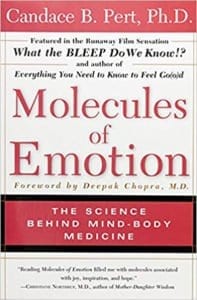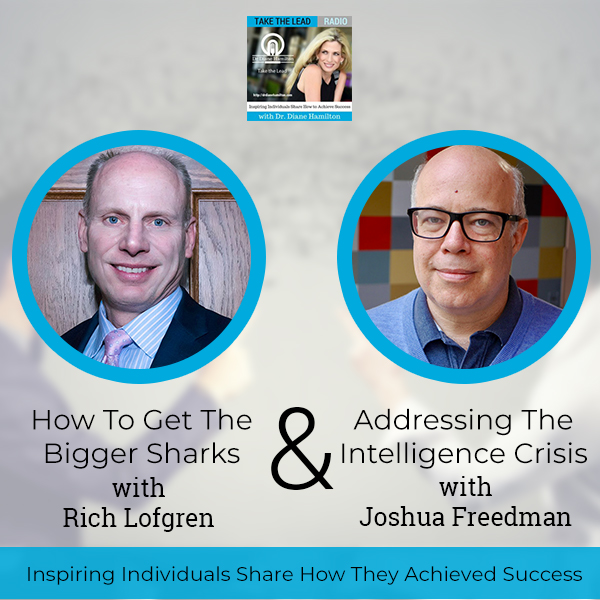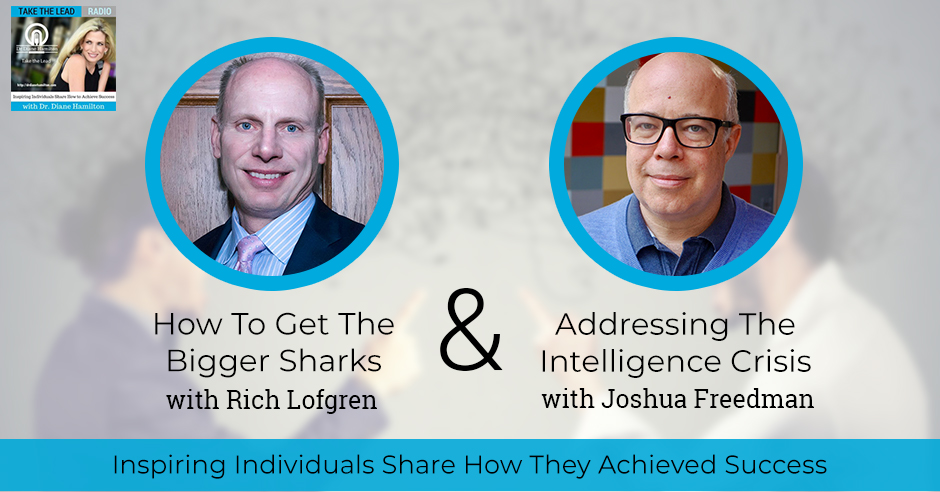Power Connector Rich Lofgren shares how he was able to connect with powerful people and how he eventually decided to create his own consulting firm. He recounts how he met Kevin Harrington and how they tried hooking the big sharks together, which they did. Rich also talks about the products that they are trying to get patented and touches on some of their big-time clients whom they met in some huge events.
In a world that has been found to have declining emotional intelligence, just how much of it affects us and will it increase? Emotions researcher and author Joshua Freedman shares his thoughts on that while talking about how he got into artificial and emotional intelligence. As he dives into their study on that field, he notes that emotional intelligence varies by generation, age, gender, and other related aspects. He also gets into how people nowadays are becoming more viable and volatile in a context of increased stress and decreased empathy.
I’m so glad you joined us because we have Rich Lofgren and Josh Freedman here. Rich is a consultant power connector and advisor to Kevin Harrington from Shark Tank and Josh is the CEO of Six Seconds, which is the world’s preeminent experts on developing emotional intelligence. We’re going to have some interesting conversations.
Listen to the podcast here
How To Get The Bigger Sharks with Rich Lofgren
I am here with Rich Lofgren who’s a consultant advisor power connector, especially an advisor to Kevin Harrington. He is connected to so many different industries from blockchain technology, construction, robotics and fascinating backgrounds. It’s so nice to have you, Rich.
Thank you, Diane. It’s great to be here.
This has been a long time coming. You have connected me with a lot of very interesting people and I appreciate that. You’re such a nice guy. I know you do a lot of work with Kevin Harrington, but you have quite an interesting background. I want people to know what you do because it’s hard to know when you say advisor, power connector. What does that mean exactly and what’s your background?
My background Diane is I’m an engineer by trade. I went to school at Northeastern University, graduated there in 1990. I went on to work with all the big worldwide major companies in the world, Stone & Webster, which became The Shaw Group, which became Chicago Bridge & Iron. Also with Bechtel, the company that built the Hoover Dam. A company that takes on challenges and makes history. I traveled the globe with all these companies and did some great things, worked on some great, fascinating projects and surrounded myself around the best in the world as it relates to construction. I did that for many years and then I said to my wife, “I’ve got to get home.” I spent 22 months, six days in China. I worked at a nuclear plant, first of its kind.
Those two units went online. We made history there. I came back home and said, “What am I going to do now?” I decided that I was going to start my own consulting company. I reached out to all types of industries, construction, blockchain, cryptocurrencies, and real estate. I started connecting to people and they started doing work with big major companies like Moog, which is a company that put their components into the space shuttle. The Saturn V rocket that put astronauts on the moon. The Mars rover. I connected this company with people that I knew in the industry with respect to robotics and nuclear work where you would operate a robot and take down a structure five miles away from where you’re standing so you didn’t put yourself in harm’s way.
I did that and started working with some neat companies. This company is five miles from where I live. I did some great things for them and started connecting to other companies. One day my wife was watching Shark Tank and she says, “Rich, you’ve had inventions and stuff that people stole from you and you didn’t do this with it and you didn’t do that.” I said, “Because I didn’t meet the right contact.” I told her one person, one event can change your life. She says, “Why don’t you reach out to these folks on Shark Tank?” I did. Kevin was the first one and I said, “I’m going to connect with him because he’s an inventor of the infomercial.
This guy seems to be sharp and he knows what he’s doing and he’s not on Shark Tank anymore, so I’m going to go after him. I did, I researched Kevin and he’s a big follower of Zig Ziglar. Zig Ziglar once said, “You can have everything you want in life by helping others get what they want.” I reached out to Kevin and I said, “I’m going to try to hook a shark. What kind of bait I need to throw out at him?” I happened to have two, three deals that I think that he would want to be a part of. Out of the blue, I contact him and then we landed a couple of deals. He became an adviser, ambassador and a shareholder on these two big companies I put in front of him and then they’re off to the races.
[bctt tweet=”One person and one event can change your life.” via=”no”]From there, I said, “Kevin, would you mind if I become an advisor?” He said, “Sure.” I said, “When?” He said, “You start now.” I said, “Can I post them on my LinkedIn?” He said, “Sure.” I said, “When can I do it?” He said, “You can do it now.” I said, “Can you do a video for me that explains what I do for you?” He said, “Sure. When do you want it?” I said, “Whenever you can.” He sent it to me the next day. That spring boarded me into a lot of different things. I’m a product scout advisor for Kevin Harrington, the world’s best. I work closely with him and his son and his business partners and do some great things. Essentially what we do is we help inventors get across the finish line.
They might have a product that they need to sell and sell it globally. They rob Peter to pay Paul, broke and open piggy banks, borrowed money from in-laws, had this great thing, but now what do you do? You got the product that’s going to change lives, save lives. What are you going to do? You’re making a lot of money. You come to me. I put you in front of Kevin Harrington and then it’s game over. That’s where we’re at. It’s exciting quickly just to be the final link to help somebody achieve their goals, their dreams, take their product and get across the finish line, and that’s what I do.
I imagine they’re all kinds of products. Let’s use my product as an example just because I want to know how you would do this. I created the Curiosity Code Index. It’s nothing like it in the world. It’s not a medical device or internet of things. Does it have to be something physical, tangible or can it be service? Can it be an assessment? What are your boundaries on that?
We will take them all if they’re a great fit and Kevin could feel it and his business partners can do things with it. Preferably, the ideal thing one of the thing you said nobody has it. That gets my ears. It just grew. If it’s patented, even better and you have a finished product. Ideally, we want those finished products patented. Nobody else got it, and then you’re talking to Kevin Harrington. We start doing our due diligence, which is lengthy. We start doing our homework and then we’d find ways to put the deal together. An idea that could be a little challenging because that takes a lot of time. Sharks live a long time, but Kevin is going to want to find something that’s like, “I can do this. I can push this.” Ideally, you want to go after those patented finished products. You are already got everything and nobody can touch it. It’s protected. Even if it’s not patent-protected, we’ll look at it. That’s typically what we want to do. We want to go off to the low hanging fruit that we know that we can get across the finish line quickly.
I assume there’s a certain arrangement percentage-wise that you guys deal with people. Each deal is different, I imagine.
I tell everybody that deals are like snowflakes and buffalo. You’ll never see the same one. Kevin will structure deals with his business partners on how best to help everyone. Nobody’s greedy. Everybody wants a fair handshake and everybody wants to be cut into the deal properly. That’s typically what they’ll do. A deal flow with Kevin Harrington is complex. It can be and they should. Deals can be structured differently. Typically, he would sit down with his business partners and decide what would be the best route for that inventor. How everybody can all succeed and win and make money together and potentially save lives on certain things that we have. They’re exciting. Overall, it’s been such a great pleasure to work with him and his team. For me personally, to help somebody get across the finish line and be that final link, it puts a smile on my face and wakes me up early in the morning.
What are some of the type of deals that you two have worked together on that you find most interesting?

Emotional Intelligence: Deals are like snowflakes. You will never see the same one.
The ones that I find most interesting because I have a medical background as well. I sold foot and ankle devices, spine products. I sold pacemakers and defibrillators. I’ve helped program devices that shocked people on a T wave and put them into an ugly rhythm. The tricky defibrillation and the device that I programmed. The capacitors would charge and plow that person, put them back into normal sinus rhythm. It had a pucker factor about 11,000, killed a person on a table and brought them back and something that I program. I’m very familiar with the medical space as well. We have some things in the pipeline that are going to change lives and hopefully save lives. Those types of products where you make money, great. You change lives, great, but to save them at the same time. Who wouldn’t be happy to have their name attached to that? That what gets me. I want to be a success. At the same time, I want to take care of people and if I know I’m saving lives, even better.
That’s interesting that you have a medical background. I worked in AstraZeneca for many years.
I know it very well. I have some friends that work for them.
It helps to have that foundation for so many different reasons. I think having a sales background helps in general.
You get in wrapped in any big company like that, you’re going to get great sales training. It’s going to teach you how to handle the objections and deal with the customer’s needs and wants and desires. I’ve learned from the best. I’ve known motivational speakers that program to be where I’m at and I would not be where I’m at from not listening to them. You’re going to realize how to deal with people. First and foremost, you got to know how to unearth their pains, aches and you’re going to solve their problems by selling them what they need. The medical sales background, it wasn’t a flop for me.
I moved on, I did different things. I got back in the saddle with engineering construction, but I did learn a lot. It took a lot away and I did work with some amazing people. One thing about me is I go to the industry leaders. I go to the people that invented this stuff. I had the fortune of meeting with Dr. Wilson Greatbatch who was the inventor of the pacemaker. I visited him for a couple of years while he was in a nursing home with his wonderful life. That guy changed the face and medical history by developing the pacemaker. He went on to have about 200 patents. He was a tail gunner in World War II. He did a lot of great things. He worked with President Bush and then President Reagan.
I’m working on some projects because we will go to the moon one day to harvest minerals and water and we’ll go onto Mars. I’m working with teams that are doing that and it all started with Dr. Greatbatch back in the early ‘80s with President Reagan. Reagan went up to him and said, “Greatbatch, I want you to help create solutions to get us back on the moon.” Greatbatch said, “There’s Helium-3 on the surface of the moon.” Reagan looked at him and said, “What’s Helium-3?” Dr. Wilson Greatbatch was quoted as saying that and he told me, he said, “Richard, one load of Helium-3 returned safely to Earth could power the entire earth for one year.” It’s no mystery. That’s why we’re going to the moon because we’re going to harvest this mineral and hopefully bring this Helium-3 back to earth and put it through a fusion reactor.
[bctt tweet=”Everybody wants a fair handshake. Everybody wants to be cut into a deal properly.” via=”no”]Naveen Jain was on the show. Do you know Naveen? I imagine you do.
I communicate with Naveen through LinkedIn and messaging. I’m quite familiar with him. As a matter of fact, I was featured in The Billionaire Chronicle, which is a great publication, BillionaireChronicle.com. I quote Naveen Jain on my article. Naveen is a great guy and brilliant. He will get us on the moon. There’s no question. He talks about moonshots. Everybody has to have moonshots. I got eleventeen of them.
Joe Polish has his Genius Network here in Arizona and Naveen spoke. I took Naveen to dinner the night before that. He was mesmerized by the moon while we were talking because he wants to get up there and do mining. At one point he said he had the first company to get an approval to do that. I’ll be very curious to see what happens with that.
I’m an engineer and I see trends in this and that and I see things and people leave tidbits behind. I’m going to paint a picture for you. We’re going to get up there. Naveen is going to run the show. We’re going to deploy caterpillar equipment. I know the people driving that ship and there are eighteen inches of Regulus, which is a stone on the surface of the moon. We strip that, we suck the Helium-3, we bring it back, there’s our alternative fuel. I know that companies are doing it. It’s all public information and I’m not sharing anything that’s not disclosed. I get emails like, “How do you know this stuff and who are you and why are you declassifying stuff?” I’m like, “I don’t work for NASA.” Although I know all the people at NASA.
It’s interesting when you talk about all this because it’s going to be fascinating to see where everything goes in terms of supply and demand. If we bring back things that we value so much, what does that do to the economic market?
This is going to get so much exposure and people don’t know about what’s going on. They understand that President Trump’s behind us and doing some great things and we will return to the moon. We’re going to go from the moon to Mars. I’m dealing with folks. The Valkyrie robot, which is a life-size humanoid robot, 6’4”, 225 pounds. It’s sitting at Northeastern University. It’s under the direction of Dr. Taskin Padir who I know very well at Northeastern. The students at Northeastern are working on it and then someday you’ll see Valkyrie up on the surface of Mars preparing us for human contact.
How far in the future do you foresee that?

Emotional Intelligence: Convergence of technologies and innovation equals exponential growth.
I’d have to say we’re looking at several years. We’ll go up there and build at the surface of Mars. It’s exciting. I know all the people that are working behind it.
Sophia is the other robot that everybody brings to all the events. I’ve seen her and it amazes me what they’re able to do. I’ve interviewed Jüergen Schmidhuber and some of the big names in AI. Some people have like, “Yes, this going to take over and humans are gone mentality.” Other people go, “It’s so far ahead in the future that we don’t have to worry about all that stuff.” Where do you fall on that spectrum of AI? Is it something you worry about or is it something you think is all good?
I am not worried about AI at all. As a matter of fact, a convergence of technologies and innovation equals exponential growth. AI is amazing obviously, and everybody is getting involved with it. I know other sharks that are heavily involved with that. That’s the only thing outside of Shark Tank that they’re investing in AI. If it doesn’t have any AI involved with it, they’re not going to even look at it. Artificial Intelligence is big and I’m learning more about it every day.
I think that everything blockchain is also huge, not just cryptocurrency. I’ve talked to so many people who are tracking education and different things. I think that it would be nice to learn more about that.
I’m working on a lot of those types of projects and one of my moonshots is a company called Seafarer Exploration Corp. I’m an advisor. They’re searching for $2 billion worth of treasure off the coast of Florida. They got a wonderful team and Kyle Kennedy. I’ve been an advisor for from quite some time. People say, “Rich, you talk about stuff on the moon, Mars and you’re looking for treasure? What does your wife say about the things that you work?” I’m marrying up robotics with them. The guy that did the Valkyrie robot, hopefully, he’ll have his little aquanaut robot in the waters helping the team so that they can collaborate on different things. Seafarer, even though it’s a treasure company, they preserve things. They’re going to go down there.
What kind of treasure?
1715 Fleet ships that left Cuba, they didn’t have the weather channel all set. When they came to the coast of Florida from Cuba, they all sunk or they ran aground because they got hit with this big typhoon that came through.
[bctt tweet=”Loneliness is increasing and empathy is decreasing despite all the ways we have to connect.” via=”no”]What was on the ship?
A lot of gold and silver and everything. They feel that they’re on the verge of finding the debris field of these two wrecks. They’ve been doing this for quite some time. You can go to SeafarerExplorationCorp.com and you can read the history. If you ever do get on the phone with Kyle Kennedy, he’ll talk you up. He’s a walking encyclopedia, a great guy. They’re using blockchain encryption. They work for the government and they’ve secured some contracts with their encryption services. Blockchain is in every industry and we’re where the internet was back 25 years ago. Everybody’s trying to get the handle around it, but blockchain and encryption is key to banking FinTech, treasure hunting, new moon expeditions. It’s into every menial artwork. I’m fascinated by it every day and I read books by the guys that started Bitcoin. Jörg Molt is a good friend of mine, he’s the Cofounder of Bitcoin, believe it or not. He’s one of the guys that unmasked himself and said, “I unmasked myself because I want everybody to know what Bitcoin’s all about, the origins and what it means.” I surround myself around successful people, so one day that I would become successful.
It’s also very interesting to be around people who have experience in areas where you grow so much. Is it Satoshi Nakamoto? Was that all about the guy who was supposed to have started Bitcoin? Do you know any more on that?
I don’t know him but he had some folks that I have met him and known like Jörg Molt. I posted on LinkedIn on my page. He was featured on Liquid Lunch where he talks about Bitcoin and about Satoshi Nakamoto being a 46-year-old individual living somewhere or hiding in Canada. I always ask Jörg and I said, “Jörg, I bet you are Satoshi Nakamoto.” I said, “Give me something that says that you’re not.” He hasn’t gotten back to me on that. Jörg knows who he is.
That’s all very interesting, the whole technology. You and I have a lot in common because I was looking at your resume. I’ve been in mortgages. I have a real estate license, sales, pharmaceutical and medical.
Do you know why? It’s because I can see why. The trend is sales experience. You begin at the sales. You start with mortgages. If you could sell somebody a mortgage and you get them to do another mortgage because they either ran into some problems when they need the money and they got to pull every line out or you get them to come back or refer you. A mortgage is very hard to sell. That’s how I got my sales experience. I met guys like Omar Periu. He’s a wonderful guy. He’s a motivational speaker. He knows everybody. He mentored the gentleman that started LA Fitness. He happened to be in Boca Raton down in Florida where I used to live and I befriended him and I became close to Omar. He’d be a great guy to have on your show too.
He sold many different things, primarily in the fitness industry. He went out and had three or four of his own fitness companies. One of the things that I got from Omar outside of just being a great friend is he always told me that a no is a maybe and a maybe is yes. If you can get people to start talking to you, you’re on your way. If you have a great product, even better. You got to believe in your product. Every time I said, “Diane, is there some point where I can follow up with you and talk about my product?” Yes, maybe. You’re going to say yes. Omar is a good friend with Zig Ziglar way back and one of his mentors and he said the same thing. Kevin and Omar are good friends. I reconnected them. They appear on their shows together and they travel around talking with each other and meeting people. I learn so much from him.

Emotional Intelligence: Consequential thinking is about pausing to evaluate consequences before you take action.
I’ll give him a quick plug, Investigative Selling, a book that he wrote is one of the all-time best books because it teaches you to be like Sherlock Holmes with a pipe and a cape. If you’re not linked in, you’re linked out. That’s my quote. Remember that. The internet gives you so much information on somebody, research them, and build rapport. You got to tie in points. The secret to sales is this. Are you a good person? The people want to be around you. A lot of people say, “Yes, I love being around Rich Lofgren but he talks too much.” That’s passion. Do your homework on people and research them. If you got a great product that’s easy to sell.
I was trying to figure out if you’re from Boston or New York, it sounds Boston but then I was looking at a lot of your New York experience. Where are you from?
I’m originally from Boston. I grew up in a town called Bellingham, Massachusetts. I traveled all around the country so I picked up different accents and morphed into it. No offense to my family. When I go back home to Boston, I cringe because it’s funny. They call me Dickie back home. “Dickie, do you want a beer? Yes, I’d love a beer.”
I have a friend from Boston and she writes it phonetically when she types texts stuff to me in Boston accent, which I get a kick out of. This has been so much fun. Rich, I’m so glad you finally got to be on my show. I think a lot of people are going to want to know how they can reach you. Is there a website or something you’d like to share?
Everybody can just look for me on LinkedIn, it’s the best way. Send me a connection. If you have a friend, a family member or a neighbor that’s got a product, I’m going to make that connection for you. I’m happy to do it. It’s just great to help people out, obviously. Like I said, one person, one event can change your life. It’s great that we finally connected, Diane. You could have everything in your life that you want by helping others get what they want. I fed you some good people. You got them on your show.
They have been great and we have a lot of different people we know in common and everybody’s been wonderful. I got to meet Kevin Harrington. I’m looking forward to hopefully getting him on the show and we can continue this conversation.
Once you get Kevin on the show you’ll enjoy talking with him and he’s going to provide some great insight on great, wonderful things that he’s working on. He’s a great guy, great employer. I love him to death. His business partner, Steve Mandell, is awesome. His son, Brian is this amazing and they’re doing some great things. I’m looking forward to that episode.
Yes, me too. It’ll be fun. Thank you so much for being on the show, Rich.
It’s my pleasure. Thank you so much and much success.
Addressing The Intelligence Crisis with Joshua Freedman
I am here with Joshua Freedman, who’s one of the world’s preeminent experts on developing emotional intelligence to improve performance. He co-developed Six Seconds EQ Certification Training. He’s the author of an international bestseller. He’s done a lot of work in the area of emotional intelligence, so I’m so excited to have him here. Welcome, Josh.
Thank you, Diane.
This is an interesting area for me because of my research. I was looking forward to this. I’ve had a few different experts on the show in the area of emotional intelligence. I find that when I did some of my research, what interested me was that there wasn’t one overall definition or the factors changed based on who was doing the research. It’s an interesting area to discuss the differences. I want to get a background on you and then maybe we can go into explaining how you came at emotional intelligence and define it.
Those two things go together. Going back to the year I was born in 1967. A woman named Karen McCowen was working on starting a school. She started interviewing lots of different people about what would be a great school. One of the groups she talks to is a group of Nobel Laureates and said, “What would have been a good school for you?” They said, “We have always been passionate about our academic topics, but we never learned very much about ourselves.” She started this school with the premise that academic development and emotional development should go together. A 1978 curriculum about that was published. In 1992, I started working there and that was the year Dan Goleman came and visited the school and said, “You guys are doing emotional intelligence.”
He said, “Tell us more about that.” I didn’t think a lot of it. His book came out in ‘95 and we started getting lots of calls because he shared in the book that our methodology was one of the two models he had found in the world of how to teach these skills. In ‘97, we started Six Seconds to answer that question. How do you use emotional intelligence? How do you grow it? How do you leverage it? We drew on at that point 30 years of experience of how we had been teaching this to children and to adults and created a model that’s not what is emotional intelligence, which Goldman describes beautifully. It’s how do you bring it forward. That’s where we’re different.
I serve on the board of Leaderkid Academy, which is a nonprofit company for developing these kinds of skills in young children. I think it’s very interesting to look at what we’re doing to improve emotional intelligence in different groups. I know that your research has shown declining emotional intelligence around the globe, which I think is interesting. Why do you think that that’s happening?
Let me tell you about the study. It’s the world’s largest study on emotional intelligence. We’re over 125 countries and we’re talking about a randomized sampling around the world. That’s a big deal. We’ve been doing this for many years. We started collecting data in 2005. We published the first report in 2010 and we’ve seen emotional intelligence scores all over the world declining empathy particularly. This report, we found that some skills had stopped declining and some skills started increasing. Self-awareness seemed to be increasing for the first time. That’s good news, but empathy not so much.
[bctt tweet=”In a context of increased stress and decreased empathy, people are more viable and volatile.” via=”no”]There’s a skill that we call apply consequential thinking, which is about pausing to evaluate consequences before you take action, and that increased. That suggests people are starting to tune in and say, “I don’t like the way I’m feeling. I don’t like what’s happening. Maybe I want to change.” Maybe moving into the more evaluative state and yet still that sense of disconnection. This, unfortunately, is corroborated by many other studies. Loneliness is increasing, empathy is decreasing despite all the ways we have of connecting people feel disconnected. That’s at work. That’s at home, that’s on college campuses. What I would say is that the underlying cause is we are emotionally overwhelmed. There’s too much happening and we’re not yet equipped to deal with the world that we are creating.
When you say too much is happening are we talking about technology? What are we talking about?
One of the things we thought, for example, in our case study with Siemens. In Latin America, we’re dealing with an incredibly volatile social situation, political situation, and economic situation. What we saw there is that the leadership team had started to internalize all those stressors. They were becoming more volatile and they recognized that. I’m sure you’ve talked to many times in your show about VUCA. In this kind of context, if we keep operating with the old rules, we are stuffed. That’s what the US military found and developed the military doctrine, which is where my understanding that term comes. You go into a battlefield situation.
I’ve worked with a lot of people in the Navy and Marine Corps and all the branches of the US military on emotional intelligence. What they say is you can’t just follow orders. It’s not what we want. We want warriors who follow the commander’s intent and figure out a way to get the job done. That means you have to appraise and say, “We’re not in this situation we thought we were in and we’ve got to adapt.” Business leaders are having a very hard time with that too. In the Siemens case, there were all of these pressures and they said, “We’ve got to adapt and we need to bring some new skills forward.” They started learning emotional intelligence. What we’ve found in that case and in many other cases is they had a massive increase in engagement, a massive increase in agility, a massive increase in their ability to collaborate and innovate as a leadership team. I think that tells the story of part of what’s happening and part of the solution.
You brought up so many great things and for anyone who doesn’t know VUCA, it’s Volatility, Uncertainty, Complexity and Ambiguity. I think that’s an important thing to understand. When you’re talking about a lot of these things that have gotten better and things that have gotten worse. It reminded me, you say how this all happened before in the ‘90s. I remember taking our performance reviews that we did every year in the ‘80s. My company rated us on our concern for impact and that stood for how much we cared about how we came across to other people.
I think that they were ahead of their time with that type of thinking as well because I don’t see a lot of that even now, which is fascinating to me. You also talked about loneliness and I know we see about the Gen Z is the most stressed generation and all these things that we read about. Everybody is feeling disconnected and it’s going to be interesting to see what happens with the newer generations in the workplace like Gen Z. I know you’ve looked at emotional intelligence by generation, age, gender, everything. I want to talk about some of the numbers because that report you sent me was great. I loved it because it answers a lot of questions. A lot of people ask me these questions. How does it vary by country? How does it vary by generation, gender, age? Do you want to hit on some of those?
This is called the State of the Heart Report and this is the 2018 report. We’ve been publishing this every couple of years in this ongoing study and people can find the whole report on the website. In terms of the comparisons, one of the things that we looked at was gender. This is always a hot topic. We found that on a macro level globally. Essentially, men’s average and mister average are the same in their emotional intelligence. The scores are so close they’re not statistics. When we start looking at the sub-skills in emotional intelligence, there are some variations on what people consider the sub-skills. Everybody in the field of emotional intelligence talks about being more emotionally aware, using our emotions more carefully and connecting with others in some way.

Emotional Intelligence: Emotions are not just something cognitive, it has a physiological survival function.
Those are the sub-skills we focused on too. In those three categories, what we’ve found is that emotional awareness, I’m sure no woman ever will be surprised by this, that women on average scored quite a lot higher than men on average. In our data, we also ask about non-binary and we just didn’t have enough data yet to report that. We just have female and male because we don’t have a large enough sample. The men’s average is much more self-aware than mister average. However, in the area that we call choose yourself, which has to do with not reacting, being responding intentionally. Mister average scores a good bit higher.
In the last area, and this is perhaps the surprising one but connecting with others, empathy, the scores are almost the same. Males are a tiny bit higher globally. The last competency that we measure on our model and in this area of connecting with purpose, being the step forward and work on in the world what you want to be adding to the world, males are a little bit higher on average. That suggests that despite that awareness, maybe in some ways the little bit lack of might be helpful for some of us males. It’s like we’re going to move on and worry about impact or maybe men’s average is saying, “I need to understand this more.” I’m not sure about that hypothesis, but I can tell you differences in the data.
I think it’s interesting to me, I write about perception as well. A big part of how people get along is how they perceive one another. My perception of you and your perception of me and then my perception of how you perceive me. You start going in circles chasing your tail sometimes. I’d like to get your insight on how we can work better with different organizations or even globally in different areas of the world. How much does perception play into this and is empathy a big part of developing to get along in terms of perception?
There are multiple parts of that. First is we’re each walking into every situation with a lens or probably a whole kaleidoscope of lenses. Some of those we’re conscious of and some of them were not. Our emotions, one of the primary neurobiological functions of emotion is to direct our attention to opportunities and threats. Emotions are here to help us survive. As a survival mechanism, emotions are causing us to tune in and notice, “There’s a risk here. There’s an opportunity here. I’m safe in this direction. I’m not safe in this direction.” We’re coloring everything we perceive to this emotional filter. That happens automatically and unconsciously. We can be emotional jerks and that still happens.
That filter is there and I think a lot of what I’ve found interesting about working all over the world has been coming to see these cultural dimensions of these lenses. I think for me one of the most interesting pieces personally has been as I travel, interact with people and have very deep conversations about their work in their life, I realize how much of my filter is cultural. How often I have this first reaction of like, “No, that’s wrong.” Half a second later you’ll say, “No, that’s different. It’s not wrong.” The ability to pause and step back from that initial reaction. Empathy is a huge part, but what I’m saying is there’s also the self-awareness part and self-management part all play into how we perceive everything that we perceive.
I know there’s religion, there’s a lot of cultural aspects and things that are very challenging for people because we’ve been brought up certain ways. Other people in other countries have been brought up certain ways. What do you find is the biggest problem to try and work in different countries?
The biggest problem connects with the earlier part of the conversation that in a context of increased stress and decreased empathy, people are more volatile, and they’re less willing to be across the difference.
[bctt tweet=”Being more emotionally aware can help us connect with people better.” via=”no”]How do we fix that?
What happens neurologically is the purpose of stress is to make us more reactive. We become more sensitive to potential threats and our brains narrow our attention to focus more on problems. It makes us more likely to fight, flee and freeze. That’s the pressure cooker that we’re in. Everybody is more pressure cooked than before. In that context, I think social media is in no way helping with this. We meet somebody who’s different with us and instead of saying, “That’s interesting.” What we say is, “You’re wrong and you’re bad.” We’re doing that because of this distress reaction and reduced empathy.
They’re saying that in politics.
They might be wrong in that, but we had to take a moment and find out.
At least think about it. It’s such an interesting thing because you see such a divide politically and in different ways and it seems people are digging their heels more than ever before. Do you see that?
Polarization, in the US for sure, but not just in the US. I’m teaching a course in a Master’s program for aspiring school principals and it’s the Columbia Teachers College Program in New Orleans. These are people who are feeling called deserve in communities that are in poverty. These young educators are on the one hand incredibly optimistic about education as a path to the future, yet they’re in communities with decades or generations of inequity. Even in this context where we’re in class together. We’re trying to have these conversations, how easy it is to get triggered by these inequities and these pressures that are part of our society.

Molecules Of Emotion: The Science Behind Mind-Body Medicine
It’s a tough time. When you talk about all this stress and all that, one of the assessments I use in my research once was a BarOn’s EQ-i because he had more of a focus on stress. I was looking at stress in sales reps at that time. I think that there’s a lot of focus on Gen Z being the most stressed group. If we’re working with all these stressed-out people and maybe that was why people like Goldman and others all moved onto mindfulness because they’re trying to fix this, is that solution? I’m sure people will ask you all the time, how do you improve empathy? Can you give some tips of ways that we can get better at some of this stuff?
It’s just two thoughts. We do a big project in collaboration with UNICEF. We have four interns here working on that and they’re all undergrads. I’m in the stick of working with Gen Zs and they’re awesome. This is a very small sample, but this is an incredibly committed group of people and it just gives me a ton of hope. I mentioned the three steps in our model and when we teach people how to practice emotional intelligence, we use the three steps. The first step is to get the data, tune in. We call it to know yourself.
Emotions are there like, “That’s interesting. I’m feeling this.” You name it to team it. It’s surfaced what’s happening and whether that’s in a team or whether that’s by yourself. Take a moment and say, “This is what’s going on and don’t fight against it, don’t judge it, don’t say it’s negative. It is what it is. I’m annoyed, disappointed, and worried. Step two, choose yourself. What that’s about is saying, “Do you have any options?” I could shout. I could go crawl back into bed. I could get up. I’m trying to make it through the morning. You have a range of options. Expand the options and consider are there any of these options that might be a little bit more helpful and how do we know if they’re helpful?
The third step we call give yourself, which sounds a little strange, but it’s serving your purpose. Give yourself is about saying, “How do I connect beyond myself right now?” What is it that I want to be doing for the longer-term?” These emotion pressures and stressors, they’re mostly very short-term oriented. Threat oriented feelings are about immediacy. We need to step back from that immediacy and say, “Pause. What’s the longer-term story here?” Those three steps, know yourself, choose yourself, give yourself or be aware, expand your options, look at what you want and do it again.
I know that Travis Bradberry and others are talking about getting sleep. Different things can help with some of these things. Sometimes it’s simple things that we don’t even think about. I know you mentioned both at SixSeconds.org. What’s Six Seconds in case people are going, “What is that?”
Emotions are neurohormones. We could have a whole conversation about the neuroscience of this, which is a fact. These chemicals exist everywhere in our brains and bodies. Our late advisory board member Candace Pert who wrote this amazing book the Molecules of Emotion. She discovered that we have receptor sites for emotions in many parts of our brains and bodies that we never knew we did. Even in our prefrontal cortex where we’re supposed to be all rational. What she taught us is that these emotion chemicals last in our brains and bodies for around six seconds. Any time we’re feeling something for longer than that essentially where we are creating that chemical.
A lot of it is just a voice in our head that what we were telling ourselves in dwelling on things that are doing that?
As Antonio Damasio said, “Emotions are embodied.” It’s not just something cognitive, it’s a physiological survival function. When they say we’re choosing that it’s not necessarily consciously choosing it, although often it is. I had a negative interaction with somebody and I woke up, it was playing through my head. I’m like, “Shut up.”
[bctt tweet=”One of the primary neuro-biological functions of emotion is to direct our attention to opportunities and threats.” via=”no”]It’s something that is harder for a lot of people because it’s hard not to go over these things in our heads. There are so many lessons that we can learn from just recognizing that we do that.
Noticing the feeling like something, it’s there to teach me something than get into this judgment, “I shouldn’t feel this.” We’re at war with ourselves and now we have two fights going on. Giving ourselves a break and just saying, “I’m feeling this. That’s interesting.”
As you were talking about different levels of emotional intelligence, I usually ask people this who have studied emotional intelligence because I like to know everybody’s different insight into it. What’s your perception of Steve Jobs’ level of emotional intelligence?
I was a teacher in this school where Goleman came to visit. The tubs were apparent there. What I could say is emotional intelligence isn’t a monolithic thing. There are many aspects just like cognitive intelligence is monolithic. When you look at your life and you say, “It’s hard for me to form trust-based relationships with the people around me. It’s hard for me to have a conversation where we can have dinner with my family or my colleagues where we can be on the same page.” That might be a signal to say, “It’s probably trying to work on some of your EQ skills.” The man was out of the park genius in some aspect of emotional intelligence, his understanding of user experience and design is mind-blowing. There were some things he said to us about how we taught emotional intelligence that we’re still working to figure out how can we do that better quite a few years later. We look at all of these people and say there’s a lot of complexity here.
It’s not so cut and dry and changed too when you grow. He is different maybe the first time at Apple as he was the second time. Some people have told me they thought he understood empathy in terms of he could read people and he would use it against them.
Cognitive empathy is different than emotional empathy. There are three parts of empathy we teach. There are cognitive empathy, emotional empathy, and empathic response. If you want to be good at empathy, you need all three.
I like to ask about him just because he’s somebody that everybody understands and read about. I wanted to find out about your United Nations conference. What was that?
This gives me a lot of hope. We talked about all of these things going on in the world. The United Nations just had the first-ever emotional intelligence conference at UN Headquarters. We were part of helping to organize that. The director for marketing presented there and shared our work that we’re doing with UNICEF that we’ll bring emotional intelligence skills to 1.5 million children with 10,000 volunteers, 100% for free. A lot of our corporate clients are involved too, either as sponsors or doing family days or holding events for either their own employees or communities. It’s a way of us contributing to changing this trend. I’m so happy that this happened at the UN. We presented to the Italian parliament, our team in Italy. Governments are starting to say, ”We need these skills for our citizens and our children.”
I enjoyed talking about all this Josh and I know a lot of people want to know more about how they could reach you and find out more about what you do. Is there a good site to share?
SixSeconds.org, we’re a nonprofit organization. There’s tons of free information there and eBooks and cases. Whether you’re interested in business or family or education or just for yourself. We’ve got a huge archive of articles and resources. Also, training on different tools and methods for bringing this into your work.
Thank you so much for being on the show.
It was fun.
—
I’d like to thank Rich and Josh for being my guest. This was such a great episode. If you’ve missed any past episodes, please go to DrDianeHamiltonRadio.com. I hope you join us for the next episode of Take The Lead Radio.
Important Links:
- Rich Lofgren – LinkedIn
- Kevin Harrington
- Curiosity Code Index
- Naveen Jain – past episode
- BillionaireChronicle.com
- Jüergen Schmidhuber – past episode
- Seafarer Exploration Corp
- Investigative Selling
- Six Seconds EQ Certification Training
- Six Seconds
- Leaderkid Academy
- State of the Heart Report
- Molecules of Emotion
- Genius Network
- SixSeconds.org
About Rich Lofgren

About Joshua Freedman





0 Comments